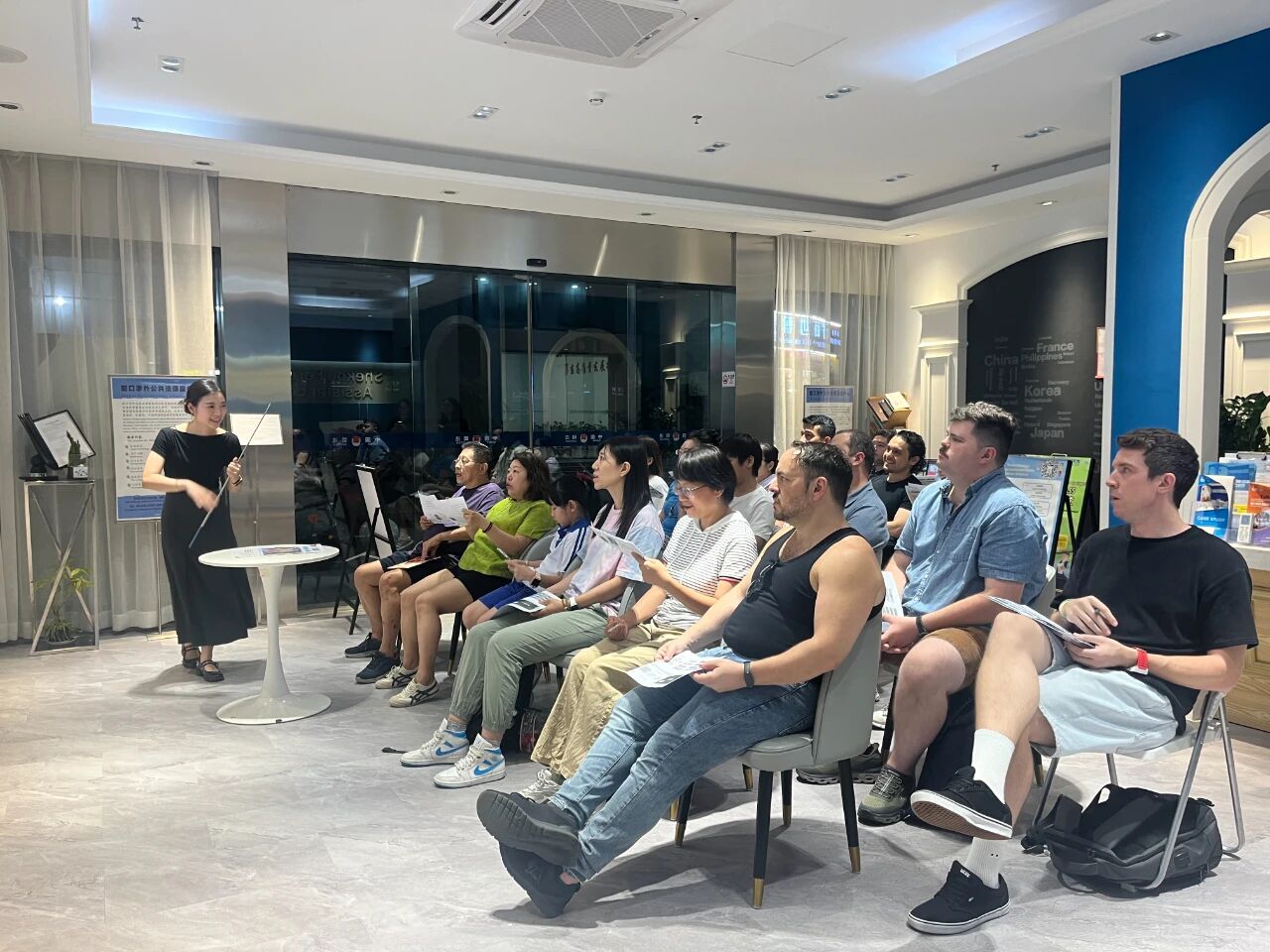English > News > Latest News
Nei hou, Shekou! Expats greet night school in Cantonese
Source: Shenzhen DailyUpdated: 2025-09-03
At 7 p.m. sharp on Sept. 2, Murat Kara from Türkiye started learning how to greet his fellow classmates in Cantonese at a language class in Shekou.
“Nei5 hou2, ngo5 giu3 Agnes,” the Cantonese instructor introduced herself to more than 20 participants who gathered at the Shekou Management and Service Center for Expats (Shekou MSCE). The class marked the commencement of the fall term of the Shekou Night School for Expats.

Participants attend a Cantonese language class in Shekou on Sept. 2, marking the start of the fall term for the Shekou Night School for Expats. Photos by Wei Jie unless otherwise stated
After repeating after the instructor several times, Kara struck up a practice conversation with American Wade Putman sitting next to him. “Hou2 gou1 hing3 sik1 dou3 nei5. Nei5 giu3 me1 meng2? (Nice to meet you. What’s your name?” he asked.
Kara is a Ph.D. student in politics at Hong Kong’s Lingnan University and is doing a project at Shenzhen University. Although he has lived in Hong Kong for four years, he said he doesn’t speak much Cantonese, and wanted to learn practical expressions for daily life back in the Cantonese-speaking Hong Kong.

Wade Putman (L) practices Cantonese with William Fitzpatrick from Ireland during the language class in Shekou on the evening of Sept. 2.
Putman felt the same. The American teacher at an international school in Shenzhen is a fan of Cantonese cuisine. “I intend to learn some Cantonese to impress local people a bit next time I go yum cha and have morning dim sum,” he said. Putman lived in Dongguan for six years before relocating to Shenzhen two years ago, and hoped a few local phrases would give him a taste of being a local Cantonese.
After practicing some basic conversational Cantonese for situations such as shopping and dining, the participants formed small groups to stage short skits using the phrases they had just learned.

Participants interact during a role-play session in the Cantonese language class.
Jorge Garcia from Mexico impressed his classmates with his quick grasp of Cantonese intonation during a skit in which he played a waiter at a Guangdong dim sum restaurant. “My wife speaks Cantonese, so I hear it a lot even though I don’t speak it,” said Garcia, who works in international trade. “I speak some Putonghua, which I find easier than the Guangdong dialect. Anyway, it’s fun tonight.”
Initiated by Shekou MSCE, the Cantonese class and the Chinese class, which is scheduled for Wednesday nights, were designed to help expats overcome the language barrier, and build a first bridge to integrating into local life, said Rita Yang, director of the center. “The classes not only equip them with everyday communication skills, but also deepen their understanding of the social logic behind the Chinese language,” she said.

Participants gather for a Chinese-language class in Shekou. Photo courtesy of Shekou MSCE
In addition to the language classes, the nonprofit program, which will run for several months, has expanded its offerings to include new classes that blend tradition and culture, such as Chinese self-defense, Chinese cuisine workshops, and introductions to traditional Chinese instruments. The morning classes, launched in April in response to requests from Shekou expats who couldn’t attend the evening sessions, feature thoughtfully crafted activities, such as outdoor morning runs that immerse participants in Shekou’s landscape, Zumba sessions that use energetic rhythms to break cultural barriers, a Chinese pastry workshop and a traditional Chinese medicine exploration class.
Tonight’s Chinese class attracted nearly 40 expats. “More people wanted to join, but we had to cap the enrollment because of limited space,” said Yang.
 Copyright © Shenzhen Nanshan Information Network Center. All rights reserved.
Copyright © Shenzhen Nanshan Information Network Center. All rights reserved.




